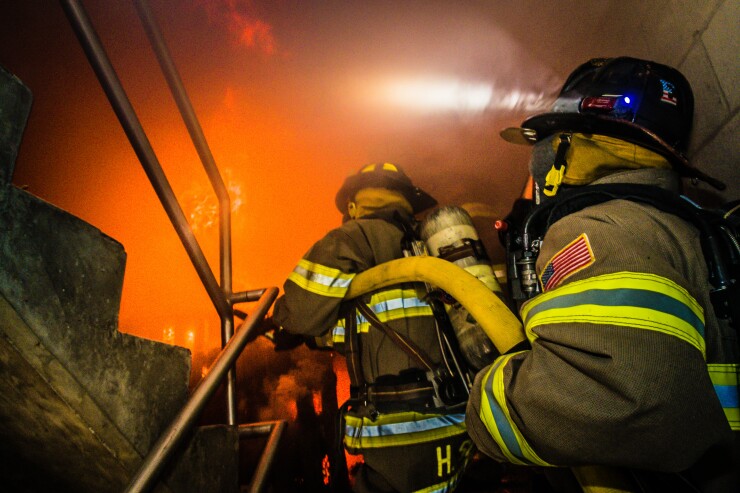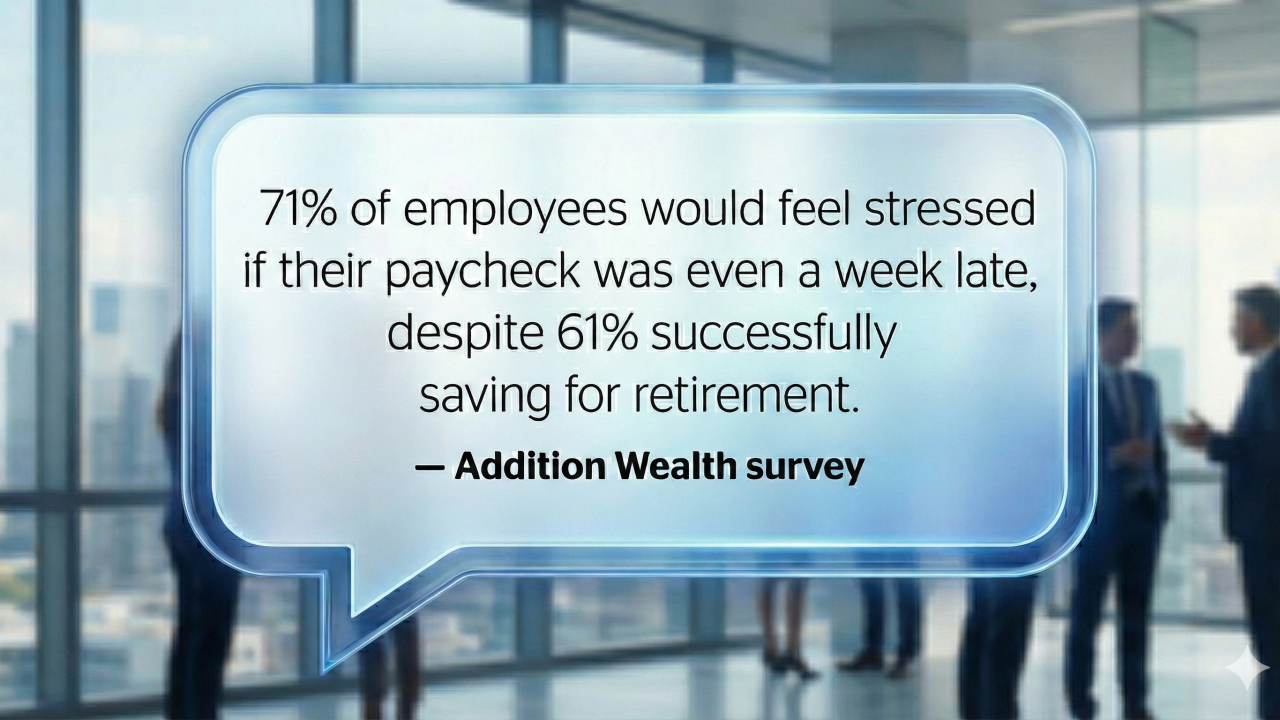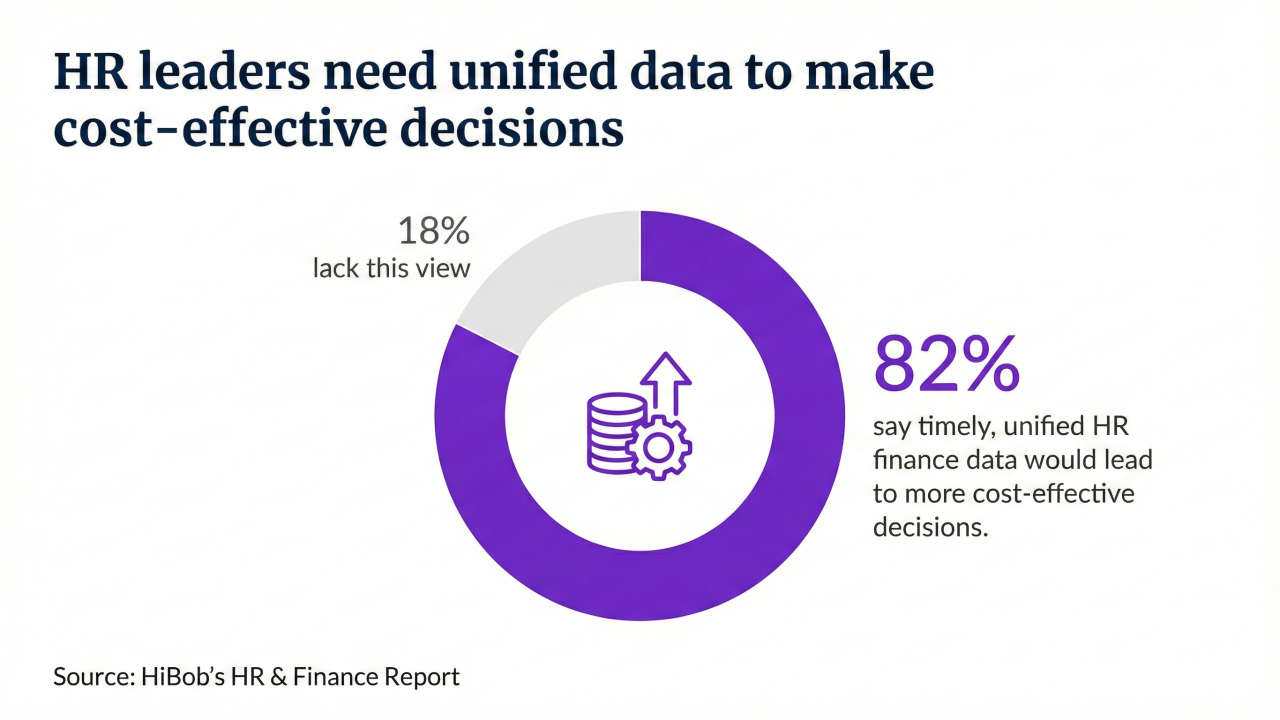Derek Farrow has been a firefighter in California for nearly a decade, but right now he's taking a step back.
After three and half months of back and forth with his department's
"Going through workers' comp is a nightmare," says Farrow. "It's almost not worth all the trouble that it adds on."
Read more:
Farrow's injury was diagnosed over a year ago, and it's not a simple one to treat. Farrow has post-traumatic stress disorder, and like any mental health condition, it does not come with a deadline or set of steps that guarantee a full recovery, and no one patient carries it the same. For Farrow, PTSD looks like insomnia, constant nightmares, flashbacks to traumatizing incidents and hypervigilance.
"It's never being able to calm down, your mind is constantly going and you're never able to recover," says Farrow. "At home, [firefighters] have to flip a switch and not be in that mode anymore. I have a daughter and a family. But it's hard to get my body to agree with that."
A common struggle
Farrow isn't alone. The U.S. Fire Administration estimates that 20% of firefighters and paramedics will meet the criteria for a PTSD diagnosis during their careers, compared to 6.8% of the general population. And yet a lack of resources and stigma surrounding
Read more:
Dr. Leslie Dobson, a California-based clinical psychologist and Farrow's therapist, warns employers and employees that PTSD isn't something workers can or should be expected to handle by themselves, regardless of their industry. PTSD impacts the patient's work and home, no matter how much they try to ignore it, underlines Dr. Dobson.
"[Patients] tend to show more signs of burnout, they are less interested in being productive, they use more sick days and are less motivated to reach their goals — they are working with a sense of hopelessness," she says. "The breaking point is an inability to come down from stress and to consistently stay present with their family and their children."
As a first responder, Farrow is placed in dangerous situations multiple times a day, with the expectation that he will save lives. But being a firefighter does not make someone super-human, explains Farrow.
"I deal with a lot of ugly stuff on the job," says Farrow. "You basically suppress it, push it down and isolate yourself from your family and loved ones. You shut down and act like everything is fine."
Read more:
But Farrow admits one can only walk that path for so long. In 2019, Farrow was involved in an incident that led to a job suspension and further informed him of his need for mental health support: Hospital surveillance footage released to the L.A. Times showed Farrow, who is white, wrapping a towel twice around the face of Earl Hatton, a black detainee, and pushing his head back to the gurney.
According to Farrow's fire department records obtained by The Times, police body camera footage also shows Farrow strike Hatton in the head, as Farrow and other first responders were transporting Hatton through the hospital.
Farrow maintains that this is only part of the story. When Farrow was transporting Hatton to the hospital, Farrow says that Hatton continuously spit on him and his team as they transported him to the hospital. While the police did place a spit guard on Hatton, Hatton chewed through it by the time they reached the emergency room, according to Farrow.
"He was fighting and kicking us, saying that he has these communicable diseases that he's going to get on us so we can take it home to our families, and infect our kids and our loved ones," says Farrow. "We had a towel at our disposal, so we placed it over his face to keep him from spitting on innocent people and myself, because it's an exposure hazard and that's assault."
The situation continued to escalate, and Hatton bit down on a cop's arm, according to Farrow.
"He latched on and was thrashing back and forth," he says. "So I did a closed hand to the side of his head to break the bite, which it did. [Hatton] had broken through the towel, the cop's uniform and skin."
Hatton was later convicted of assaulting a woman with a brick and resisting arrest, and was sentenced to four years in prison. Farrow went on to accept a 12-day suspension after working for over a year following the initial incident.
A mental health reckoning
After the footage was released, the L.A. Times covered the incident and Farrow's eventual suspension in 2020. Online backlash to Farrow's case coincided with a national reckoning around race, after Black Lives Matter protests led half a million people to demand justice for George Floyd and other Black victims of police brutality. Many Americans outside the Black community began questioning whether the police and the U.S. justice system are racist institutions, and if they could be trusted.
Read more:
Black Americans are three times more likely than white Americans to be killed by the police, according to the Harvard T.H. Chan School of Public Health. The U.S. Sentencing Commission notes that Black men who commit the same crimes as their white counterparts, on average receive 20% longer federal prison sentences. Black and Indigenous Americans also experienced the largest increase in suicide rates in the last decade, while being the least likely to receive mental health treatment compared to other demographics, according to the Kasier Family Foundation.
The
For many, that surveillance footage and Farrow's role represented just how poorly Black Americans are treated by those who have a duty to protect them. But for Farrow, he alleges those moments were his attempts to get Hatton care as safely as possible, without harm to himself or his colleagues.
"You get spit on and hit and things like that, when all we're trying to do is get people to the hospital and to the care they need," says Farrow. "You can't protect yourself to the full extent like a normal civilian because we are held to a higher standard, and I have to keep my job to provide for my daughter. I just have to show up and avoid it the best I can — but I'm still in the crosshairs."
The 2019 incident, along with the constant tragedy and death he witnessed on the job and the suicides of fellow firefighters, pushed Farrow to a breaking point. He needed help and found Dr. Dobson, who was approved by his workers' comp claim. And while Farrow is grateful he can receive care through his job, he knows it's not easy to access mental health resources, let alone paid leave. Even if his colleagues know they need help, knowing where to start, and then navigating the administrative burden that comes with accessing their own benefits (workers' comp being a notorious example) can be enough to deter them altogether, explains Farrow.
Read more:
"My department is trying to do a better job — we have numerous therapists, like marriage and family therapists, available to everyone, and a mental health facility with doctors, nurses and mental health professionals," he says. "The problem that I've seen and dealt with is how to go about accessing those."
Combatting the stigma
Stigma is another pervasive
"Mental health teams come to the station, but they don't get the participation from us," he says. "You get these two therapists coming in and asking, 'Are you guys feeling stressed or burned out?' And everybody just jokes around and keeps their guards up."
Dr. Dobson has noticed this response across industries. It's clear employees often do not feel safe sharing their struggles with mental health anywhere near their colleagues or bosses — and employers have to take some of the blame, Dr. Dobson says.
"A lot of our employers in America really want us to white-knuckle it through our careers, and they don't educate us on work-life balance or on what burnout looks like," she says. "So when we feel like we are starting to have symptoms, we do not know how to name it or what to do with it. And with something like employee assistant programs, you don't want people to see an invoice with your name on it. It threatens your image in the company."
Read more:
Farrow doesn't regret making the decision to find a therapist or fighting for leave. But he does wish the process was simpler, because getting care from a mental healthcare professional has been life-changing for him.
"There's so many things your body and brain suppresses just to be in fight or flight mode. Just to survive another day," says Farrow. "It's been good talking about them, along with a good support network outside of therapy. These are healthy coping mechanisms."
Farrow believes it should be mandatory for firefighters to speak with mental health professionals within work hours on a consistent basis. Getting help can't be too stigmatized if everyone is receiving it.
"There are things everybody is going through on the job: seeing dead kids, shootings, stabbings, fires, friends die," says Farrow. "It should be mandatory to talk to the professionals we have at our disposal and there should be mandatory time off after critical incidents."
Dr. Dobson encourages employers to implement reward systems that encourage workers to take time or utilize their mental health resources. She also notes that peer-support groups could be vital resources if employers allow the group to serve as a safe space within the workplace.
Both Dr. Dobson and Farrow know that inclusive, accessible mental healthcare is a necessary part of what makes up safer and happier workplaces and communities. If nothing else, Farrow wants other firefighters to know what they're feeling deserves care and treatment. He wished someone told him that when he first started his career.
"You're going to experience the worst kinds of scenarios and situations that you can't even imagine," says Farrow. "If you start feeling depressed or anxious, you're having flashbacks, you can't sleep, that's not normal behavior. We need to discuss them and we need to know how to properly process those things in a healthy way."






